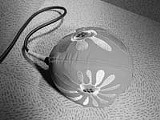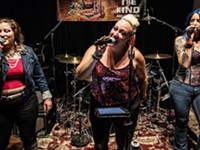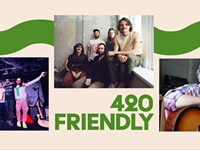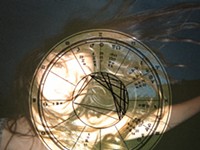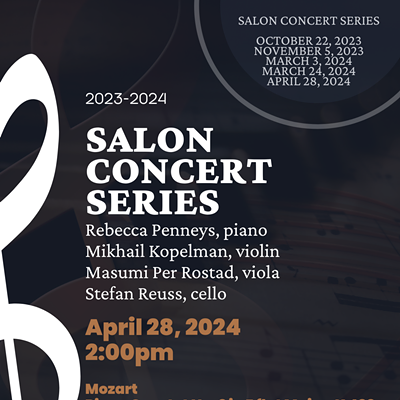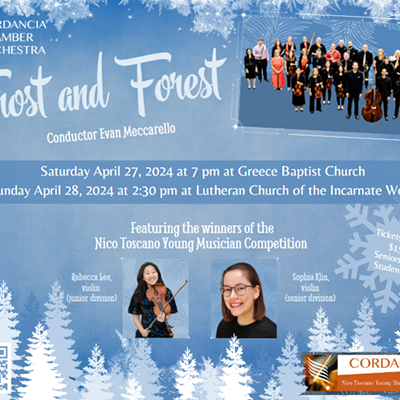[
{
"name": "500x250 Ad",
"insertPoint": "5",
"component": "15667920",
"parentWrapperClass": "",
"requiredCountToDisplay": "1"
}
]
In June, there's good reason to shuffle off to Buffalo: The June in Buffalo festival. To the outside world, June in Buffalo, started by composer Morton Feldman in 1975, is a week of contemporary music concerts hosted by the University at Buffalo. To participating young composers, however, it is a conference of workshops that bring them in contact with more established composers, who serve as "resident faculty" for the week.
Afternoon concerts present the younger composers' music; evening concerts present music of the resident faculty composers. (Most of the concerts are free.) Each morning the resident faculty composers give lectures and critiques.
In 2000, festival director David Felder "started 'thematic programming' as a way to focus the festival." This year the theme is music and computers --- also known as "computer music."
If music has an international language, it must be computer-eze. The festival this year has 18 resident faculty composers flying in from Asia, Europe, and all over North America.
Due to the wonders of technology (e-mail), it was not hard to get the composers to spill the beans on the latest trends in computer music. They make it clear: The three most important words in today's computer music are interaction, interaction, and interaction. And what makes interaction between mind and machine more attractive than ever is the power of today's computers.
"Speed is not just a matter of convenience," says Roger Reynolds of UC San Diego "it is the difference between guesswork --- I'll try this and hope I'm right --- and interactive work in which constant adjustments are possible as one seeks a particular result."
What about interaction between machines and live musicians? "Earlier electronic musics were based on fixing elements to an electronic tape," says Ed Campion of UC Berkeley, "or [more recently] subjecting a live sound to some kind of real-time technological process."
For instance, in Lucent Auquarelle (Friday, June 4), by Takayuki Rai of Japan: "The live computer system samples the sound of the harp, performs digital signal processing on it, and reproduces the transformed harp sound in the hall in real-time," Rai says.
Yet "today's computers," Campion adds, "can [also] participate with live instrumentalists in fantastic, new, musically rich ways."
One example is Not About Water (Thursday, June 3). "It is written for a quartet of three acoustic instruments and computer," says composer Robert Rowe of New York University. "The computer is listening to the piano and adding its [own] part in synchrony with the human performers."
"There is also an implicit tension in the combination [of computer and live instrumentalist] which I find compelling," adds Cort Lippe of University at Buffalo. Just because musicians and machines can play nice, doesn't mean they always do.
"The electronic world (akin to the artificial) and the acoustic worlds don't naturally cohere," Campion says, "and that is the underlying theme of most of my compositions with computer and electronics. At the end of Losing Touch [Wednesday, June 2] the fixed electronic part becomes a mechanical set of sequences that the soloist cannot and does not care to follow."
"The next step," says University of Montreal's Robert Normandeau, "will see the development of new interfaces that will replace the mouse and the keyboard and will behave more like a conventional instrument." Or, as Denmark's Lars Graugaard calls it, "a unique category of instruments."
For many composers, the computer is already the instrument of choice; working directly with sound, composers are more self-sufficient. "The composer then is closer to a painter or to a writer; there is no intermediate between his thoughts and the music," says Normandeau. "It is like making an animation film for a filmmaker."
Computers also allow the composer to play instrument-maker. "I now consistently develop my own sound-processing tools as an integral part of the compositional process," says Ben Thigpen, who flies in from Paris. "This allows me to imagine and implement processes that will have just the kind of animation and energy that I need for a certain piece, rather than working within the limitations of pre-packaged [software] programs --- which are never aesthetically neutral."
It's not all about technology, though. Several of the works focus on nature. In Elainie Lilliois's Earth Ascending (Saturday, June 5) "themes of earth, water, fire, and nature play central roles in each of the three texts [by three contemporary women poets]," Lilliois says. "The first text, Earth-Body, Light-Body, represents an ethereal journey, a realization of the unity between nature and the self." Aural images of sand and water create the mood.
High culture, pop culture, and culture-clash provide other inspirations: Normandeau's StrinGDberg is for a production of August Strindberg's play Miss Julie. The 1960s psychedelic aesthetic, Iron Butterfly, and Led Zeppelininspired Heavy/Light, a piece by Princeton's Steven Mackey. A trip through India, playing Bach solo cello suites, inspired With Dadaji in Paradise, by MIT's Tod Machover.
Computer music offers something for nearly every musical impulse. Your children's could be next. On Tuesday, June 1, Fisher Price will demonstrate Hyperscore, Tod Machover's computer music software for kids. It now comes as a handheld toy --- so if you know any potential junior computer music composers, be sure to bring them along.
June in Buffalo, will include nine afternoon and evening concerts from Tuesday, June 1, through Saturday, June 5, at University at Buffalo North Campus and Albright-Knox Art Gallery. Info: www.music.buffalo.edu/juneinbuffalo, 716-645-2765 ext 1254.
Latest in Music Features
More by Josh Mailman
-
Renaissance treasures
Jun 8, 2005 -
We must have been good this year
Nov 17, 2004 -
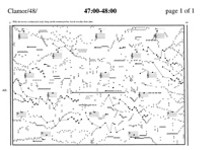
Curious music in the great outdoors
Sep 29, 2004 - More »
